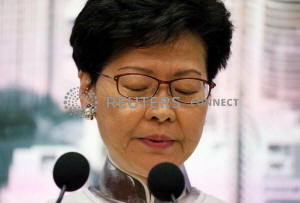|
China stands by Hong Kong leader after
days of street protests
 Send a link to a friend
Send a link to a friend
 [June 17, 2019]
By Clare Jim and James Pomfret [June 17, 2019]
By Clare Jim and James Pomfret
HONG KONG (Reuters) - China doubled down on
its support for Hong Kong leader Carrie Lam on Monday after days of
protests in the Chinese-ruled city over a planned extradition bill, and
a source close to Lam said Beijing was unlikely to let her go even if
she tried to resign.
Lam's attempts to pass a bill that would allow people in Hong Kong to be
extradited to China to stand trial triggered the biggest and most
violent protests in the former British colony in decades.
As the political crisis entered its second week, demonstrators and
opposition politicians braved intermittent rain to gather near the
government's offices and call for the bill to be killed and for her to
step down.
The upheaval comes at a delicate time for Chinese President Xi Jinping,
who is grappling with a deepening U.S. trade war, an ebbing economy and
regional strategic tension.
Hong Kong has been governed under a "one country, two systems" formula
since its return to Beijing in 1997, allowing freedoms not granted to
the mainland, including an independent judiciary, but short of a fully
democratic vote.
Many residents are increasingly unnerved by Beijing's tightening grip
and what they see as the erosion of those freedoms, fearing that changes
to the rule of law could imperil its status as a global financial
center.
"The Chinese government, the central government, has always fully
affirmed the work of chief executive Carrie Lam and the Hong Kong
government," Chinese Foreign Ministry spokesman Lu Kang told a news
conference.

The comments echoed remarks over the weekend from the government's Hong
Kong and Macau policy office.
"The central government will continue to firmly support the chief
executive and the SAR government’s governing in accordance with the
law," he said, referring to the "special administrative region" of
China.
TWO MILLION
Protest organizers said almost two million people - out of Hong Kong's
population of around seven million - turned out on Sunday to demand that
Lam resign, in what is becoming the most significant challenge to
China's relationship with the territory since 1997.
The mass rally, which police said drew 338,000 participants at its peak,
forced Lam to apologize over her plans to push through the bill.
On Monday, protesters near the government's offices blocked roads and
called for Lam to withdraw the bill, release arrested students, drop the
official description of a rally on Wednesday that involved clashes with
the police as a riot, and step down.
A senior Hong Kong official close to the Beijing-backed Lam told Reuters
on Monday Beijing was not likely to let her step down, even if she
wanted to, saying "it would create more sorts of problems than it
solves, at all sorts of levels".
Lam stopped short of explicitly killing the bill, but the official said
the postponement meant that it was effectively dead.
Still, many in Hong Kong are unhappy at the prospect of legislation that
lawyers and judges say risks exposing people to the mercy of a mainland
justice system plagued by torture, forced confessions and arbitrary
detention.
The bill would cover Hong Kong residents and foreign and Chinese
nationals living or traveling through the city.
"We cannot accept her apology, it doesn't remove all our threats," said
social worker Brian Chau, one of several hundred protesters who stayed
overnight in the Admiralty district around the government headquarters
and legislature.
[to top of second column]
|

Hong Kong Chief Executive Carrie Lam looks down during a news
conference in Hong Kong, China, June 15, 2019. REUTERS/Athit
Perawongmetha/File Photo

'EVIL LAW'
In a coincidence of timing, Hong Kong activist Joshua Wong, the face
of the city's push for full democracy, walked free from prison on
Monday and vowed to join the mass protest movement.
"I will join to fight against this evil law," said Wong, 22, one of
the leaders of the 2014 "Umbrella" pro-democracy protests that
blocked major roads in Hong Kong for 79 days.
"I believe this is the time for her, Carrie Lam the liar, to step
down."
Two former post-colonial leaders, Tung Chee-Hwa and Leung Chun-ying,
were forced to cut short their time in office amid controversies
linked to policies that stoked fears of Chinese encroachment on the
city's freedoms.
The latest crisis escalated during Wong's five-week jail term for
contempt of court. Until this month, the failure of the Umbrella
protests to wrest concessions from Beijing, coupled with
prosecutions of at least 100 protesters, had discouraged many young
people from going back out on the streets.
But Lam's efforts to ram through the proposed extradition bill
galvanized opposition.
On Monday, the benchmark index climbed 0.4%, having risen more than
1% in early trade, outperforming gains in Asia ex-Japan and onshore
China. Most tenors in interbank lending rates shortened, after a
spike last week during the protests.
The city's "highly leveraged property owners are breathing a
collective sigh of relief, and the Hang Sang is in a celebratory
mood as well", Stephen Innes, managing partner at Vanguard Markets,
said in a note.
Hong Kong opposition politicians echoed marchers' calls for both Lam
and the proposed law to go.
"Her government cannot be an effective government, and will have
much, much, much difficulties to carry on," veteran Democratic Party
legislator James To told government-funded broadcaster RTHK.
"I believe the central people's government will accept her
resignation."
Some demonstrators cleared rubbish left after the vast, but
peaceful, march while others sang 'Hallelujah', the unofficial
anthem of protests against Lam.
U.S. President Donald Trump would likely raise the issue of Hong
Kong human rights with China's Xi at a potential meeting of the two
leaders at the G20 summit in Japan next week, U.S. Secretary of
State Mike Pompeo said on Sunday.

British Prime Minister Theresa May will raise the protests with
Chinese Vice Premier Hu Chunhua, who is on a visit to London to
boost economic and financial cooperation, May's spokesman said.
(Additional reporting by Marius Zaharia, Farah Master, Vimvam Tong,
Anne Marie Roantree, Noah Sin and Greg Torode in HONG KONG, Ben
Blanchard in BEIJING and William James in LONDON; Writing by John
Ruwitch; Editing by Nick Macfie)
[© 2019 Thomson Reuters. All rights
reserved.]
Copyright 2019 Reuters. All rights reserved. This material may not be published,
broadcast, rewritten or redistributed.
Thompson Reuters is solely responsible for this content. |